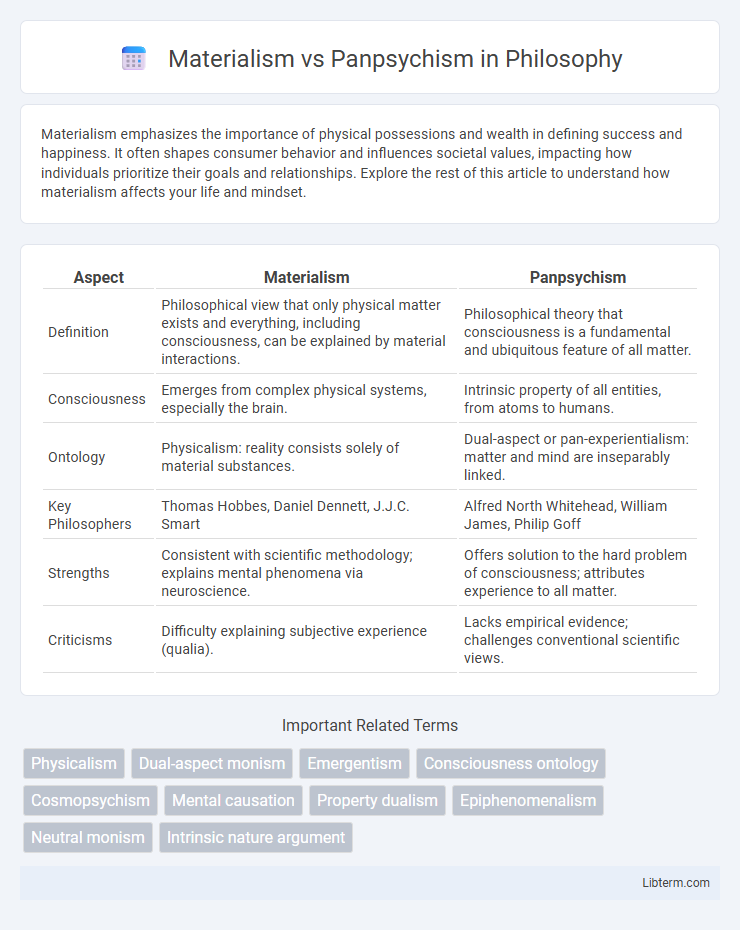Materialism emphasizes the importance of physical possessions and wealth in defining success and happiness. It often shapes consumer behavior and influences societal values, impacting how individuals prioritize their goals and relationships. Explore the rest of this article to understand how materialism affects your life and mindset.
Table of Comparison
| Aspect | Materialism | Panpsychism |
|---|---|---|
| Definition | Philosophical view that only physical matter exists and everything, including consciousness, can be explained by material interactions. | Philosophical theory that consciousness is a fundamental and ubiquitous feature of all matter. |
| Consciousness | Emerges from complex physical systems, especially the brain. | Intrinsic property of all entities, from atoms to humans. |
| Ontology | Physicalism: reality consists solely of material substances. | Dual-aspect or pan-experientialism: matter and mind are inseparably linked. |
| Key Philosophers | Thomas Hobbes, Daniel Dennett, J.J.C. Smart | Alfred North Whitehead, William James, Philip Goff |
| Strengths | Consistent with scientific methodology; explains mental phenomena via neuroscience. | Offers solution to the hard problem of consciousness; attributes experience to all matter. |
| Criticisms | Difficulty explaining subjective experience (qualia). | Lacks empirical evidence; challenges conventional scientific views. |
Understanding Materialism: The Physicalist Worldview
Materialism, also known as physicalism, asserts that everything in the universe is fundamentally composed of physical matter and energy, rejecting any non-physical substances or properties. This worldview maintains that all mental states and consciousness arise solely from physical processes within the brain, aligning with neuroscientific findings that link cognition and neural activity. Materialism provides a framework for scientific inquiry by emphasizing empirical evidence and the laws of physics as the basis for understanding reality.
Defining Panpsychism: Consciousness in All Things
Panpsychism posits that consciousness is a fundamental and ubiquitous aspect of all matter, contrasting sharply with materialism, which views consciousness as emerging solely from physical brain processes. This philosophical perspective asserts that even the smallest particles possess some form of experiential quality or proto-consciousness. Defining consciousness in this inclusive manner challenges materialist assumptions and suggests a more integrated understanding of mind and matter throughout the universe.
Historical Roots of Materialism and Panpsychism
Materialism traces back to ancient Greek philosophers like Democritus and Epicurus, who asserted that all phenomena result from material interactions and atoms forming the basis of reality. Panpsychism, with roots in pre-Socratic thinkers such as Thales and Plato, posited that consciousness or mind is a fundamental and ubiquitous aspect of all matter. Both perspectives have evolved through centuries, influencing metaphysical debates on the nature of mind, matter, and existence.
Core Differences Between Materialism and Panpsychism
Materialism asserts that reality is composed solely of physical matter, with consciousness emerging from complex neural interactions, whereas panpsychism posits that consciousness is a fundamental and ubiquitous feature of all matter. Materialism emphasizes empirical evidence and physical causality, rejecting non-physical properties, while panpsychism integrates subjective experience as intrinsic to all substances. The core difference lies in materialism's reduction of mind to matter versus panpsychism's attribution of proto-consciousness to even the simplest physical entities.
Arguments Supporting Materialism
Materialism asserts that consciousness arises solely from physical processes in the brain, supported by extensive neuroscientific evidence linking mental states to neural activity. The principle of empirical verification favors materialism, as it relies on observable, measurable phenomena, contrasting with panpsychism's speculative attribution of consciousness to all matter. Materialism's explanatory power in technology and medicine, through understanding brain disorders and developing treatments, further strengthens its scientific credibility over panpsychism.
Arguments in Favor of Panpsychism
Panpsychism posits that consciousness is a fundamental and ubiquitous aspect of reality, addressing the hard problem of consciousness by attributing mental properties to all matter. This view aligns with integrated information theory and quantum mechanics interpretations suggesting intrinsic experiential qualities in physical entities. By rejecting the materialist notion that consciousness emerges solely from complex brain processes, panpsychism offers a coherent framework that bridges the subjective experience with the physical world.
The Mind-Body Problem: A Comparative Analysis
Materialism asserts that consciousness emerges solely from physical brain processes, reducing mental states to neurobiological functions. Panpsychism posits that consciousness is a fundamental and ubiquitous feature of all matter, thereby providing a non-reductive approach to the mind-body problem. This comparative analysis reveals that materialism emphasizes empirical neurobiology while panpsychism challenges the explanatory gap between physical processes and subjective experience.
Implications for Science and Consciousness Studies
Materialism frames consciousness as an emergent property of physical processes within the brain, guiding neuroscientific research to focus on neural correlates and biochemical mechanisms. Panpsychism posits that consciousness is a fundamental feature of all matter, urging scientists to reconsider the boundaries between physical systems and subjective experience. This philosophical divergence impacts experimental methodologies and theoretical models in consciousness studies, influencing how subjective awareness is interpreted and measured across disciplines.
Criticisms and Challenges Facing Both Views
Materialism faces criticism for its difficulty in explaining subjective experience or consciousness, often labeled the "hard problem of consciousness," which challenges the reduction of mental states to purely physical processes. Panpsychism struggles with the "combination problem," questioning how fundamental conscious experiences of particles integrate to form the unified consciousness observed in higher organisms. Both views grapple with bridging explanatory gaps between physical phenomena and conscious experience, highlighting ongoing philosophical and empirical challenges.
The Future of Consciousness Research: Materialism or Panpsychism?
The future of consciousness research increasingly explores the dichotomy between materialism and panpsychism, with materialism positing that consciousness arises solely from neural processes in the brain, while panpsychism suggests that consciousness is a fundamental property of all matter. Emerging scientific approaches, such as integrated information theory and quantum cognition models, challenge strictly materialistic frameworks by proposing that consciousness may be more universally embedded in physical reality. Ongoing interdisciplinary studies in neuroscience, philosophy, and physics aim to resolve whether consciousness can be fully explained by brain activity or requires a paradigm shift towards panpsychism's inherent sentience in all substances.
Materialism Infographic

 libterm.com
libterm.com